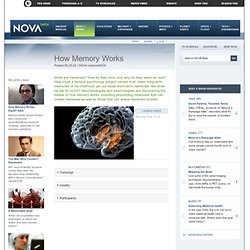

Your Surgeon May Be A Psychopath (But Don’t Worry) Conversation. Brain Physiology. The brain and the rest of the nervous system are composed of many different types of cells, but the primary functional unit is a cell called the neuron.

All sensations, movements, thoughts, memories, and feelings are the result of signals that pass through neurons. Neurons consist of three parts. The cell body contains the nucleus, where most of the molecules that the neuron needs to survive and function are manufactured. Dendrites extend out from the cell body like the branches of a tree and receive messages from other nerve cells. Signals then pass from the dendrites through the cell body and may travel away from the cell body down an axon to another neuron, a muscle cell, or cells in some other organ. The neuron is usually surrounded by many support cells.
Scientists have learned a great deal about neurons by studying the synapse, the place where a signal passes from the neuron to another cell. Neurological Disorders When the brain is healthy it functions quickly and automatically. Doubling Your Brain Power (Part 1 of 4) Alzheimer’s vaccine trial a success. A study led by Karolinska Institutet in Sweden reports for the first time the positive effects of an active vaccine against Alzheimer's disease.

The new vaccine, CAD106, can prove a breakthrough in the search for a cure for this seriously debilitating dementia disease. The study is published in the scientific journal Lancet Neurology. Alzheimer's disease is a complex neurological dementia disease that is the cause of much human suffering and a great cost to society. According to the World Health Organisation, dementia is the fastest growing global health epidemic of our age. The prevailing hypothesis about its cause involves APP (amyloid precursor protein), a protein that resides in the outer membrane of nerve cells and that, instead of being broken down, form a harmful substance called beta-amyloid, which accumulates as plaques and kills brain cells. There is currently no cure for Alzheimer's disease, and the medicines in use can only mitigate the symptoms.
The Human Memory - Sources & References. How Memory Works. How Memory Works PBS Airdate: August 25, 2009 NEIL DeGRASSE TYSON: Most of us hold in our minds, memories of our lives, so vivid that when we recall them, they seem real and indelible.

They're an essential part of who we are. But as we explore the mechanics of the brain, we're starting to learn exactly what these memories are made of. And it turns out a lot of it boils down to chemistry. As correspondent Chad Cohen reports, researchers are discovering the precise molecules that can create memories, as well as the molecules that can erase them forever. CHAD COHEN (Correspondent): This is the brain that, more than any other in history, has allowed scientists to make sense of your brain. With H.M.' JACOPO ANNESE (The Brain Observatory/University of California, San Diego): You can imagine the brain being like a book, and our tissue slices are the pages of this book. CHAD COHEN: It's a story that begins with epilepsy, epilepsy so severe that by 1953, H.M. had reached his breaking point. 1. 2.
8 Things Everybody Ought to Know About Concentrating - StumbleUpon. “Music helps me concentrate,” Mike said to me glancing briefly over his shoulder.

Mike was in his room writing a paper for his U.S. History class. On his desk next to his computer sat crunched Red Bulls, empty Gatorade bottles, some extra pocket change and scattered pieces of paper. In the pocket of his sweat pants rested a blaring iPod with a chord that dangled near the floor, almost touching against his Adidas sandals. On his computer sat even more stray objects than his surrounding environment. Mike made a shift about every thirty seconds between all of the above. Do you know a person like this? The Science Behind Concentration.